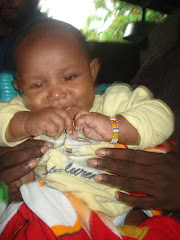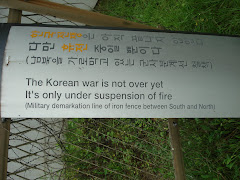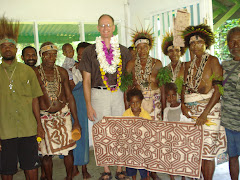Monday, September 22, 2008
Visit to Santa Cruz Island
I arrived in the Solomon Islands a week ago, September 16. Wednesday the 17th I flew to Lata, the provincial capitol of Temotu province. Holy Martyr’s Friary has been perched on a cliff overlooking an amazing lagoon with an active volcano in the background for about 10 years. Initially it was a house made of local materials: palm and bamboo with a few home-milled planks (made with a chainsaw). Gradually over the years the brothers and their friends have hauled concrete, lumber, masonite, corrugated iron roofing up the face of a slippery coral cliff and built a permanent building. As yet there is no electricity or running water, so life goes by different rhythms: sleep when its dark, then awake and working in daylight.
In the brothers’ prayers they always give thanks for the air they breathe, the water they drink and the food that God provides. I was struck by the appropriateness of these prayers: water comes straight from heaven and all they need to do is catch it in barrels. Food is available to anybody who can handle a hoe or spear, firewood is abundant in the forests. Abundance, yes, but at the cost of some hard work!
There is a large group of both men and women students at a nearby training school who have become Companions of SSF. In honor of my visit they decided to prepare a meal: sit down dinner for 50. So my first day we all armed ourselves with axes and attacked a dead tree like an army of ants, everybody chipping away and passing the chunks of wood down the line of workers to the friary. The next day Br. Ini went diving with a young man who aspires to be a friar, Morris. While they were away, Br. Martin and I split some firewood, swept the house and chapel. When the brothers returned with about 24 fish the Companions also showed up with bags of stones to use to build “ovens”—a layer of stones, then fire, with more stones on top (oven is ready to use when all the stones are hot). Leaving the stones, they headed out swinging their machetes, to collect banana and bread fruit leaves to cook with. Another crew headed to the Brothers’ gardens to dig potatoes: kumara and cassava. After re-grouping, they all went in search of coconuts up in the bush. On the third day—early in the morning (yes it does have paschal overtones) they returned [about one a.m.] to kill the pig, peel the roots and grate the coconut meat and build fires in the outbuildings to begin heating stones for cooking. In spite of heavy
rain and weak flickering light from kerosene lamps they were happy, going about their tasks singing and flirting with each other. By six a.m. the ovens were all sealed, with pig, fish, pudding and potatoes baking. We spent the day in near catatonia, until about 4:00 p.m. when they companions returned to put the finishing touches on the meal. At 5:00 everybody departed to get cleaned up, and they returned at 6:30 for an evening Eucharist lit by two flickering candles and a smoky oil lamp.
At Eucharist I preached homily about generosity. In the Epistle Paul wrote the Romans not to conform themselves to the way of the world, but to live differently, and that everybody has their role to play in the work of the Gospel; he exhorts people whose gift is to be a giver—to give generously. In the Gospel of John we heard about the generosity of God, who loved the world so much that he sent his only Son to live as one of us…living in the world as generous people we stand over against the way of the world which often promotes competition, winners and losers, people whose main concern is to protect themselves. I feel that the way of life these friars and students share is one which the world needs to emulate. Not the sweat and trouble of primitive living in a tropical jungle (though if you try it you might like it as much as I do), but of living in conscious reliance on the grace of God and interdependently with each other, seizing the opportunities to celebrate life. This is the Franciscan way.
After the Eucharist there was a lull while the team of servers put the food out on banana leaves on the floor of the dining room. Finally it was ready and we all pushed into the small dining hall and crouched on the floor over our pile of food. Food has rarely tasted so good! There were speeches, songs, prayers. Above us the stars shone intensely and a breeze tossed the tree tops.
In the brothers’ prayers they always give thanks for the air they breathe, the water they drink and the food that God provides. I was struck by the appropriateness of these prayers: water comes straight from heaven and all they need to do is catch it in barrels. Food is available to anybody who can handle a hoe or spear, firewood is abundant in the forests. Abundance, yes, but at the cost of some hard work!
There is a large group of both men and women students at a nearby training school who have become Companions of SSF. In honor of my visit they decided to prepare a meal: sit down dinner for 50. So my first day we all armed ourselves with axes and attacked a dead tree like an army of ants, everybody chipping away and passing the chunks of wood down the line of workers to the friary. The next day Br. Ini went diving with a young man who aspires to be a friar, Morris. While they were away, Br. Martin and I split some firewood, swept the house and chapel. When the brothers returned with about 24 fish the Companions also showed up with bags of stones to use to build “ovens”—a layer of stones, then fire, with more stones on top (oven is ready to use when all the stones are hot). Leaving the stones, they headed out swinging their machetes, to collect banana and bread fruit leaves to cook with. Another crew headed to the Brothers’ gardens to dig potatoes: kumara and cassava. After re-grouping, they all went in search of coconuts up in the bush. On the third day—early in the morning (yes it does have paschal overtones) they returned [about one a.m.] to kill the pig, peel the roots and grate the coconut meat and build fires in the outbuildings to begin heating stones for cooking. In spite of heavy
rain and weak flickering light from kerosene lamps they were happy, going about their tasks singing and flirting with each other. By six a.m. the ovens were all sealed, with pig, fish, pudding and potatoes baking. We spent the day in near catatonia, until about 4:00 p.m. when they companions returned to put the finishing touches on the meal. At 5:00 everybody departed to get cleaned up, and they returned at 6:30 for an evening Eucharist lit by two flickering candles and a smoky oil lamp.
At Eucharist I preached homily about generosity. In the Epistle Paul wrote the Romans not to conform themselves to the way of the world, but to live differently, and that everybody has their role to play in the work of the Gospel; he exhorts people whose gift is to be a giver—to give generously. In the Gospel of John we heard about the generosity of God, who loved the world so much that he sent his only Son to live as one of us…living in the world as generous people we stand over against the way of the world which often promotes competition, winners and losers, people whose main concern is to protect themselves. I feel that the way of life these friars and students share is one which the world needs to emulate. Not the sweat and trouble of primitive living in a tropical jungle (though if you try it you might like it as much as I do), but of living in conscious reliance on the grace of God and interdependently with each other, seizing the opportunities to celebrate life. This is the Franciscan way.
After the Eucharist there was a lull while the team of servers put the food out on banana leaves on the floor of the dining room. Finally it was ready and we all pushed into the small dining hall and crouched on the floor over our pile of food. Food has rarely tasted so good! There were speeches, songs, prayers. Above us the stars shone intensely and a breeze tossed the tree tops.
Subscribe to:
Post Comments (Atom)






No comments:
Post a Comment